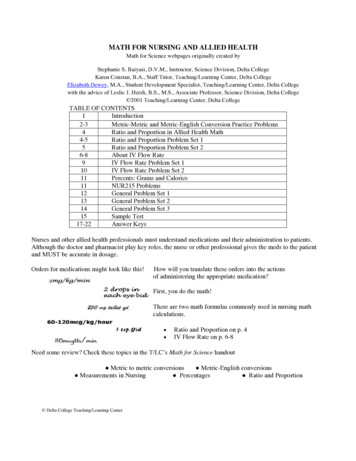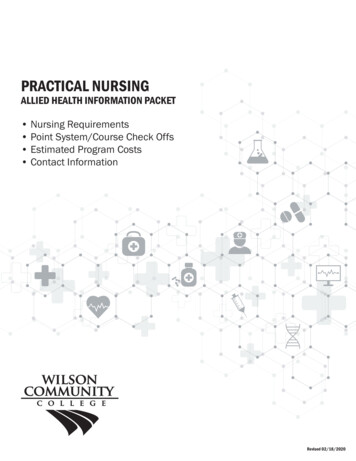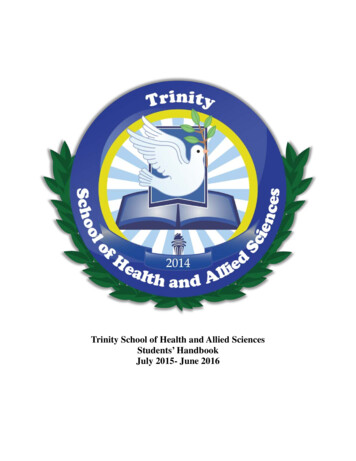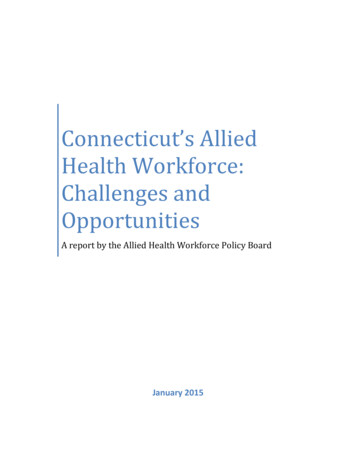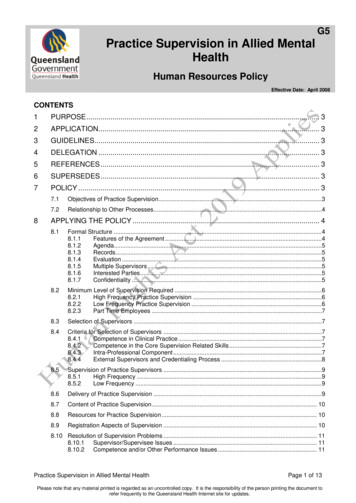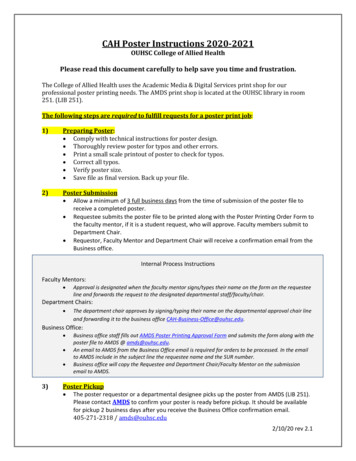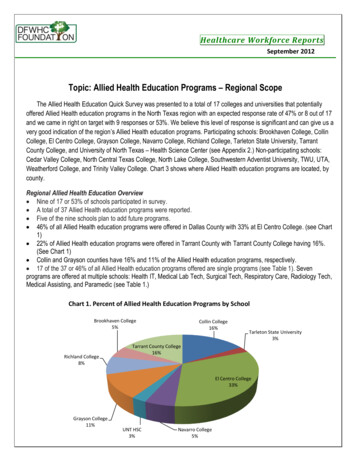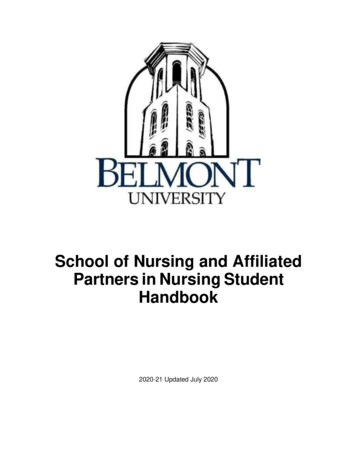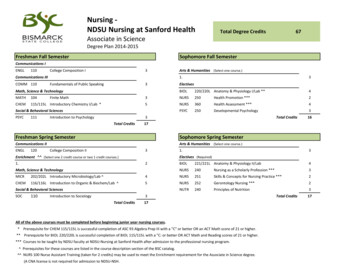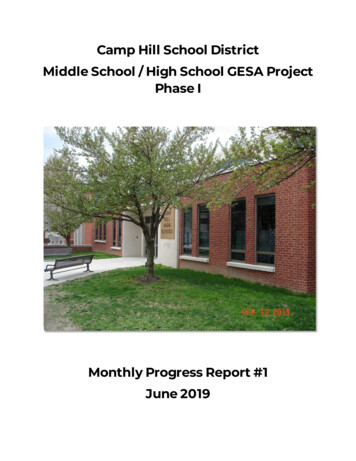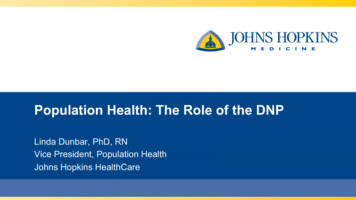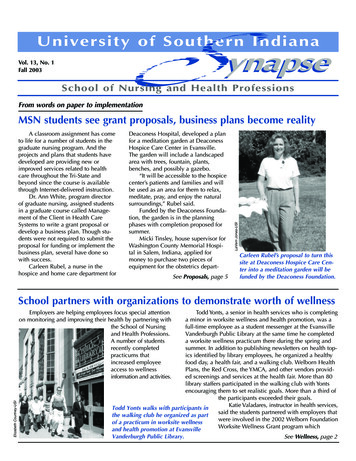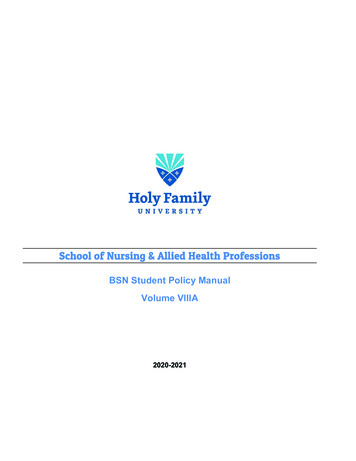
Transcription
School of Nursing & Allied Health ProfessionsBSN Student Policy ManualVolume VIIIA2020-2021
CONTACT INFORMATIONHoly Family UniversityPhiladelphia Campus9801 Frankford AvenuePhiladelphia, PA 19114School of Nursing and Allied Health ProfessionsNursing Education Building, Room 115267-341-3293Note to the reader: An electronic version of this handbook and all related formsand documents is available online. Visit dy/academics-philadelphia-school-of-nursing for information.2 Holy Family University Policy Manual: Volume VIIIA
Table of ContentsSchool of Nursing and Allied Health ProfessionsPolicy ManualTable of Contents . 3SCHOOL OF NURSING & ALLIED HEALTH PROFESSIONS BSN STUDENTHANDBOOK . 71.0INTRODUCTION TO BSN HANDBOOK. 72.0SCHOOL OF NURSING AND ALLIED HEALTH PROFESSIONS (SONAHP) MISSION,VISION AND VALUES STATEMENTS . 73.0HOLY FAMILY UNIVERSITY NURSING PHILOSOPHY . 83.1 Humankind . 83.2 Environment . 83.3 Health . 83.4 Nursing . 93.5 Education . 94.0BSN PROGRAM DESCRIPTION . 105.0BSN PROGRAM . 105.1 BSN Program Mission . 105.2 BSN Curriculum . 105.3 BSN Curriculum Design . 115.4 BSN Curriculum Outcomes by Level. 126.0BSN PROGRAM TRACKS . 136.1 Pre-licensure Tracks . 136.1.1 Traditional BSN Track . 136.1.2 Second Degree BSN Rapid Degree Day and Evenings and Weekends Tracks . 136.2 Post Licensure RN-BSN Track (Accelerated Format) . 136.2.1 RN-BSN Transfer of Nursing Credit . 137.0COURSE SEQUENCE FORMS. 157.1 Traditional BSN . 157.2 Fast Track Second Baccalaureate Degree Pre-Licensure BSN Program . 167.3 BSN Course Requirements: Post-Licensure Accelerated RN-BSN . 188.0COMMUNICATION . 198.1 Change in Personal Information. 198.2 Student Mail Folders . 19Holy Family University Policy Manual: Volume VIIIA – Page 3
8.3 Communication Board . 198.4 Student Opportunities . 199.0 ESSENTIAL COMPETENCIES FOR NURSING STUDENTS . 209.1 AACN Essential Functions & Disability Accommodations . 209.2 Essential Competencies . 21Introduction . 21Competencies regarding comprehension . 21Competencies regarding communication . 21Clinical competencies . 22Miscellaneous . 229.3 Support Services. 239.3.1 Center for Academic Enhancement . 239.3.2 Computer Labs . 239.3.3 Nursing Academic Support . 239.3.4 Open Nursing Laboratory . 2310.0STUDENT NURSE ORGANIZATIONS . 2310.1 Sigma Theta Tau International Honor Society of Nursing . 2310.2 SNAHF – Student Nurse Association of Holy Family . 2411.0STUDENT ADVISING . 2412.0REGISTRATION . 2512.1 Registration . 2512.2 Course Schedules . 2513.0FACULTY OFFICE HOURS . 2514.0HONORS POLICY . 2514.1 Policy . 2514.1.1 Pre-licensure Track BSN Students . 2514.1.2 Post-licensure RN-BSN Track Students . 2614.2 Procedure . 2615.0BSN STUDENT POLICIES . 2615.1 Admission, Grading and Continuation Policies . 2615.1.1 Rapid Degree BSN Admission Policies . 2615.1.2 Traditional BSN Admission Policies . 2615.1.2.1 Criteria for admission to the Traditional BSN Program . 264 15.1.2.2 Criteria for Validation for Entrance to BSN program, second semestersophomore year (200 level) . 27Holy Family University Policy Manual: Volume VIIIA
15.1.2.3 Admission Criteria for Internal Change of Concentration . 2715.1.3 Grading Policy. 2815.1.3.1 Grading Scale . 2915.1.4 Continuation Policies . 2915.1.4.1 Professional Conduct . 2915.1.4.2 Clinical Credentials . 3015.1.4.3 Medication Calculation . 3015.1.4.4 Academic progression . 3115.1.4.5 Program Dismissal . 3215.1.4.6 Grievance Procedures and Progression Policy . 3215.1.5 Academic Testing . 33Missed Exam . 3515.1.6 BSN Academic Dispute and Challenges . 3515.2 BSN Clinical Policies . 3615.2.1 BSN Cancellation of Clinical Experience Due to Inclement Weather . 3615.2.1.1 Policy . 3615.2.1.2 Procedure . 3615.2.2 BSN Clinical Credentials Policy . 3715.2.2.1 Policy . 3715.2.2.2 BSN Procedure for Clearances . 3815.2.3 BSN Clinical Uniform Policy for Clinical Agencies and Lab and SimulationExperiences . 4115.2.4 BSN Policies for Clinical Experience . 4215.2.4.1 Clinical/Lab Make-up Assignments . 4415.2.4.2 BSN Professional Behavior . 4415.2.4.3 BSN Safety Criteria . 4615.2.4.4 BSN Clinical Conduct Policies . 4715.2.4.5 BSN Patient Confidentiality Policy . 4815.2.5 BSN Health Insurance Policy . 4915.2.5.1 Policy . 4915.2.5.2 Procedure . 4915.2.6 BSN Pregnancy and Postpartum Clinical Policy . 4915.2.6.1 Policy . 4915.2.6.2 Procedure . 4915.2.7 BSN Clinical Experience: Student with an Illness/Injury. 50Holy Family University Policy Manual: Volume VIIIA – Page 5
15.2.7.1 Policy . 5015.2.7.2 Procedure . 505.3 BSN Medication Safety Policy. 5015.3.1BSN Procedure. 5015.4 BSN Religious Accommodation (Adapted from Tufts University) . 51Definitions . 5115.5 BSN Program Comprehensive Examination and Level Exams . 5215.5.1 BSN Policy . 5215.5.2 Procedure / Eligibility and Preparation for Comprehensive Exam . 5215.6 ATI Policy . 536 Holy Family University Policy Manual: Volume VIIIA
SCHOOL OF NURSING & ALLIED HEALTH PROFESSIONSBSN STUDENT HANDBOOKHoly Family University retains full regional accreditation as an institution of higher learningoffering baccalaureate and master’s degrees from the Middle States Association of Collegesand Schools.Approval from the Department of Education for the Commonwealth of Pennsylvania hasbeen established from the inception of the baccalaureate program in the 1970s.The baccalaureate degree program in nursing at Holy Family University is accredited by theCommission on Collegiate Nursing Education, 655 K Street NW, Ste 750, Washington, DC,20001, 202-887-6791.1.0INTRODUCTION TO BSN HANDBOOKThe faculty of the School of Nursing and Allied Health Professions welcome you to theBachelor of Science in Nursing Program (BSN). We look forward to working with you overthe next several years.As a member of the University community, you have had the opportunity to become familiarwith the University Catalog and this Student Handbook. Your knowledge of thesepublications is essential to your success as a student in the University. The BSN Handbookhas been developed to inform and assist you in understanding the unique requirements ofthe BSN Program and to ensure a proper atmosphere for academic, spiritual, and socialgrowth.Students are responsible for knowledge of these policies, procedures, and standards ofconduct; enrollment is considered as acceptance of all conditions specified in this handbook.2.0SCHOOL OF NURSING AND ALLIED HEALTH PROFESSIONS(SONAHP) MISSION, VISION AND VALUES STATEMENTSMission: To educate students within the University environment, at the graduate andundergraduate levels, to assume a professional role in the delivery of high quality care innursing, radiologic science and health promotion and wellness, and to cultivate a sense ofresponsibility to be actively involved in service to the human family.Vision: To provide exceptional quality nursing, radiologic science, and health promotion andwellness education in a caring, collegial, faith-based environment that challenges students andfaculty to extend their intellectual horizons.Values: The mission and values of the SONAHP are built upon the core values of Holy FamilyUniversity: family, respect, integrity, service and responsibility, learning and vision.Holy Family University Policy Manual: Volume VIIIA – Page 7
3.0HOLY FAMILY UNIVERSITY NURSING PHILOSOPHYThe Philosophy of Nursing at Holy Family University embodies and enlarges upon theinstitutional mission by including statements of values and beliefs about humankind, theenvironment, health, nursing and education. These statements provide the foundation for theconceptual and theoretical bases for the Nursing programs.In the setting of a small Catholic liberal arts university, the nursing curricula are committed tothe development of the whole person. Through close personal interaction between studentsand faculty, an atmosphere of mutual respect, and an environment, which facilitates dialogue,trust is developed. In the context of the Judeo-Christian tradition, nursing fosters a reverencefor the dignity of the human family, and a respect for the uniqueness of the individual.Furthermore, an appreciation for education as a liberating force is highly valued.3.1 HumankindA diverse and complex creation of God, humankind is a unique combination of body, mind,and spirit.Humans exist within the contexts of the individual, family, group, community, nation, andworld. Humans have the capacity for self-knowledge, the ability to choose, think critically, andassume responsibility for themselves and others.3.2 EnvironmentThe environment is complex in nature and is a continuous dynamic interchange of physical,psychosocial, cultural, spiritual, economic, and political contexts within a global world. Theeffects of the environment on the health of individuals, families and communities areaddressed by nursing.3.3 HealthHealth is a dynamic multidimensional state fluctuating along a wellness-illness continuum. Theresponsibility for health lies ultimately with the person and society, not with any one segmentof that society. Individuals can take deliberate action to promote, maintain, enhance, and/orrestore health for themselves and society.8 Holy Family University Policy Manual: Volume VIIIA
3.4 NursingNursing encompasses the arts and sciences and requires the integration of specializedknowledge and skills in providing comprehensive care for individuals, families, andcommunities. The art of nursing primarily consists of the use of self in caring for others andrequires an appreciation of the whole person. The development of a sense of service andsocial consciousness is important to the role of the professional nurse. Nursing as a sciencebuilds upon extant theories from nursing and other disciplines. Nursing science generates andtests hypotheses to develop comprehensive nursing knowledge for the delivery of nursingcare.Professional nursing involves accountability for the diagnosis and treatment of actual andpotential human responses throughout the lifespan. Nursing as a profession assists humanbeings in the management of these responses on a continuous basis to sustain life andhealth, recover from disease or injury, and/or die with dignity.Nursing actively participates in developing a quality, accessible health care delivery system.Nursing practice focuses on health promotion, disease prevention, early detection of illnessand health restoration. Essentially, nursing provides a human service that encourages selfreliance in the management of health care. Nursing in partnership with consumers and healthteam members, assists in the development of healthy communities. Working collaborativelywith other members of the health care team, nursing ensures clients’ rights to activelyparticipate in planning their health care.3.5 EducationNursing education is engaged in developing critical thinking and critical reasoning skills. Theapplication of knowledge based on scientific principles, which incorporates research intopractice, is essential in the development of the professional nursing role. The partnershipbetween faculty, student, and consumer is a key component for learning in all Nursingprograms. Faculty and students are critical thinkers and active learners. Faculty facilitateslearning and provides guidance for students through expanded learning experiences. Studentsare assisted to assume responsibility for
The baccalaureate degree program in nursing at Holy Family University is accredited by the Commission on Collegiate Nursing Education, 655 K Street NW, Ste 750, Washington, DC, 20001, 202-887-6791. 1.0 INTRODUCTION TO BSN HANDBOOK The faculty of the School of Nursing and Allied Health Professions welcome you to the
